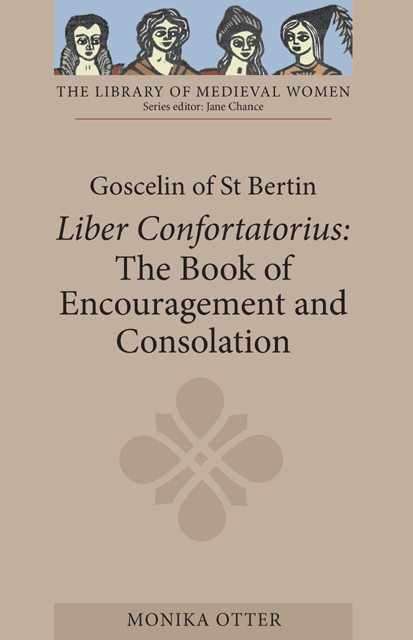Interpretive Essay: Inclusae Exclusus: Desire, Identification and Gender in the Liber Confortatorius
Published online by Cambridge University Press: 21 March 2023
Summary
Goscelin's long, idiosyncratic letter called the Liber Confortatorius – the book of encouragement and consolation – begins with this striking salutation: “Inclusae exclusus, solitarie a mundo solitarius in mundo, quem Christus et caritas noverit, unice anime scribit”: “The excluded to the enclosed; the solitary in the world to the solitary from the world; one who is known to Christ and to Love, writing to his only soul.” This magnificent formula beautifully captures the contradictory moves of Goscelin’s letter: the play on inside and outside, his painful and complete separation from his “only soul,” and his desire to identify with her, even merge with her. While the Liber Confortatorius is primarily a document of spiritual guidance, or spiritual formation, as Barbara Newman puts it, it is in many ways more about the advisor than about the advisee. Goscelin is trying to work on his own “formation,” giving shape to his shattered self, and one way in which he achieves this formation is to identify closely with his “unica anima,” the recluse Eva.
The Liber Confortatorius (like the later and better-known letters to anchoresses, Aelred of Rievaulx’s De Institutione Inclusarum and the anonymous Ancrene Wisse) is self-consciously in the tradition of St. Jerome’s letters of counsel to his female friends. In his capacity as priest and teacher, Goscelin instructs and counsels Eva, suggests readings, spiritual practices, meditations, strategies for managing and harnessing the rigors of a solitary life. But, as Goscelin himself points out, the book is more about him than about her; the “comfort” of the title is for him at least as much as for her. It is as much his attempt to come to terms with his loss as it is a treatise of spiritual advice. Goscelin devotes the first of the four books to overcoming his grief and writing himself into the traditional role of spiritual advisor. But even then, the Liber Confortatorius remains concerned with his loss, his hopes of recovery (such as they are), his relationship with her. Especially in the early part of the book, the model and intertext of Augustine’s Confessions is more prominent than Jerome. Goscelin recommends it for Eva’s reading, but more importantly uses it as a role model for himself.
- Type
- Chapter
- Information
- Goscelin of St BertinThe Book of Encouragement and Consolation [Liber Confortatorius], pp. 151 - 167Publisher: Boydell & BrewerPrint publication year: 2004

